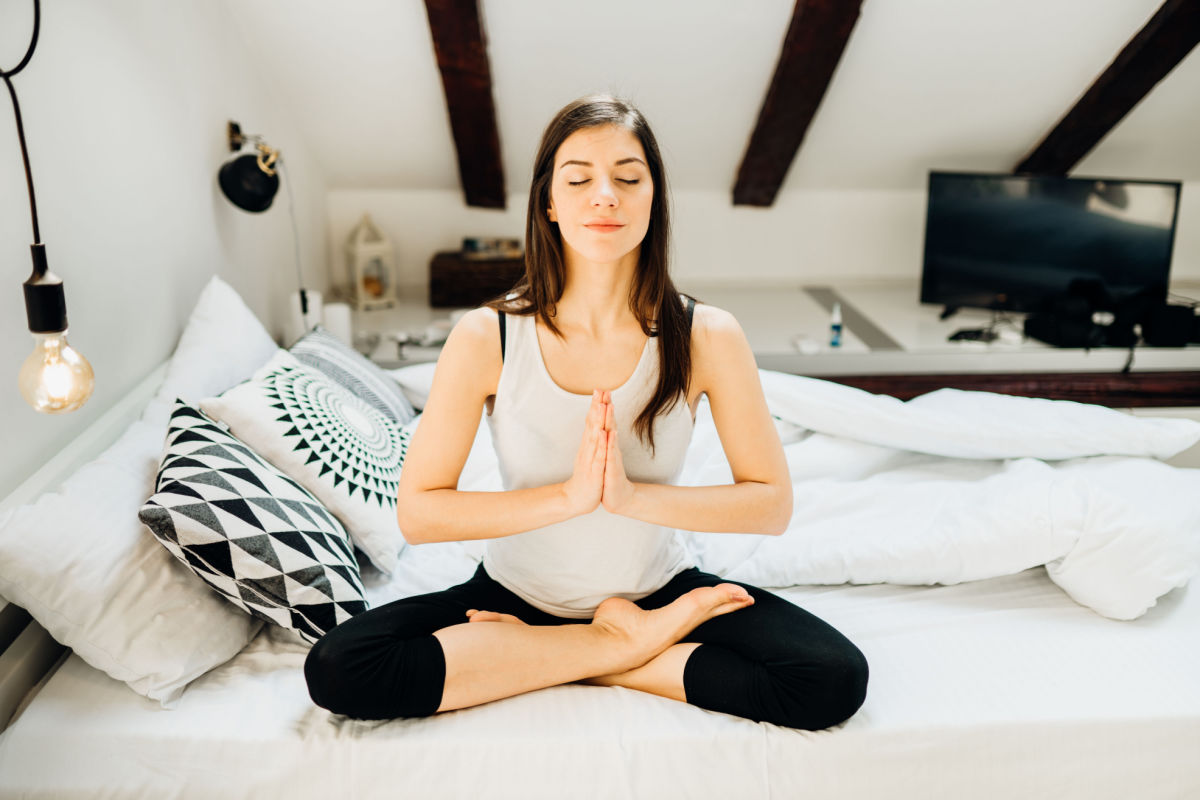Meditation for Anxiety: 5 Tips to Get Started
Explore these tips for guided meditation for anxiety - perfect for beginners. Plus learn some new and effective mindfulness exercises to reduce stress.
Meditation can bring us into a deep state of relaxation, causing inner peace, which is why meditation for anxiety coping is such a useful strategy. When meditating, you eliminate the stream of cluttered and overpowering thoughts crowding your brain that are causing you to feel anxious.
Although meditation might take some practice, we all can meditate, and what’s great: it can be done literally anywhere.

Practice Meditation for Anxiety with These 5 Tips
If you’re suffering from a generalised anxiety disorder and are looking for a coping strategy, then you should give meditation a go. Starting meditation for the first time might seem like a completely unknown world, but it doesn’t have to be difficult.
Follow these five tips to get started!
Tip 1: Be Kind to Yourself
First things first, the initial step for meditation is to get into a comfortable position in a quiet space and focus inwards. Become aware of your natural breathing pattern, which will help you to simply be in the present moment.
Once you have discovered your natural breathing rhythm, you should let it grow deeper to support the easing of your anxiety.
If you find your mind starts to wander, bring your attention back to your breath. Be kind to yourself if your mind wanders again, it's a difficult thing to learn how to be present, and this is why we need to practise meditation so that we can nail it.
Why this works: By showing yourself some compassion, you are more likely to be successful in relaxing your mind and therefore it will not wander as much.
Tip 2: Deep Belly Breathing
This strategy of breathwork is the quickest method of reducing anxiety. It can be useful before a nerve-racking event or even in helping you to fall asleep.
To practise this method, you should rest your hands on your stomach and breathe in deeply, ensuring to send your breath downward towards the abdomen.
Sometimes imagining that there is a balloon inside your stomach can help. On your inhale, the belly (balloon) expands; on the exhale, the balloon deflates.
Why this works: Deep belly breathing stimulates the vagus nerve, which runs from the head to the colon, activating a relaxation response.
Tip 3: Mantra Meditation
A mantra can be a word repeated over and over to help with concentration during meditation. You should pick the type of mantra that resonates with you.
- Positive self-affirmation (e.g. I am deserving of happiness)
- Simple chant (e.g. om)
Then, repeat your mantra over and over again for a few minutes. Each time you get distracted, don't stress, simply take yourself back to your chosen mantra until you are completely focused on it.
Why this works: This form of meditation for anxiety works because it helps to take away overwhelming thoughts, as it gives your brain another focus point.
For assistance with developing mantras and positive affirmations, get in touch with one of our experienced readers.
Tip 4: Mindfulness Meditation
Mindfulness meditation helps us to become aware of our anxiety-inducing symptoms. By meditating, we can teach our brains not to get attached to these negative thoughts, and just simply let them be.
Similar to deep belly breathing, begin by bringing awareness to your natural breathing rhythm. Feel the rise and fall of the abdomen and chest.
Once you’re aware of your breathing, bring awareness to your thoughts and emotions by imagining each thought as a cloud moving across the sky and constantly changing.
Why this works: Mindfulness helps with anxiety because it creates an environment of openness and non-judgement. Confronting the source of your troubles in this manner can help to reduce their significance.
Tip 5: The 333 Rule
This technique is an easy anxiety-reducing strategy to be used at the moment something triggers your anxiety.
The 333 rule is an easy grounding technique, directing anxiety sufferers to identify three objects they can see, hear, and touch. Start by using your breathing technique of choice to relax your body, then go on to identify your objects.
Why this works: This form of meditation for anxiety works because it moves the perspective back to your physical surroundings, rather than your thoughts.
What Types of Meditation Are Good for Anxiety?

Meditation is an umbrella term for the various routes of achieving a relaxed state of spiritual being. Whilst we have explored the techniques of mindfulness, the 333 rule, mantra and deep belly breathing, the techniques of meditation for reducing anxiety do not stop there.
There is a range of other mediation types you might want to explore.
- Guided meditation: You will create images of places or situations you find to be relaxing. Even imagining smells, sights, sounds and textures. This can be particularly useful when waking up from anxious dreams to help you get back to sleep.
- Qi gong: You will combine physical movement, physical sensations, and breathing exercises to restore and maintain balance in your body.
- Tai chi: You will perform a series of movements in a slow, graceful manner while practising deep breathing exercises.
- Yoga: You will perform a range of postures and controlled breathing exercises to engage a flexible body and a calm mind, whilst being encouraged to focus on the present moment.
For advice on which type of meditation might be best for you or to book a telephone psychic reading, get in touch.
How Long Should You Meditate Each Day?
Our time is precious and we should be finding time each day to meditate.
Five minutes of meditation a day should be enough to help clear your mind of any anxiety and reduce stress.
However, research on inexperienced meditators found that meditating regularly for 8 weeks for 13 minutes a day is preferable to gain real benefits. These 13 minutes helped to decrease negative mood as well as decreased the anxiety of participants.
Other studies report that 20 minutes of meditation a day is the equivalent of 4-5 hours of deep sleep.
New to Meditation for Anxiety? Psychic Sofa Offers Expert-Led Guidance
Meditation can bring us into a deep state of relaxation, which is why practising meditation for anxiety can be so beneficial. Not only can it alleviate your stress but also improve your overall mental health.
Despite this, meditating for beginners can be difficult. If you feel as though some guidance could be useful to get you started, then please get in touch with one of our professional readers to help guide you.
Likewise, if you are struggling with anxiety, then a personal reading might be beneficial from one of our professional psychics.
Submit A Comment
Create a Psychic Sofa account today!
Join the Psychic Sofa Community Today and get access to:
- Get notified by (FREE) SMS text when a reader becomes available!
- Latest offers and members only exclusives
- Add favourite readers to your profile





Comments
No comments have been made yet